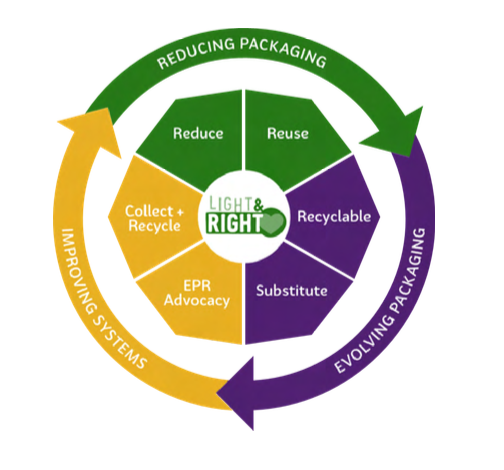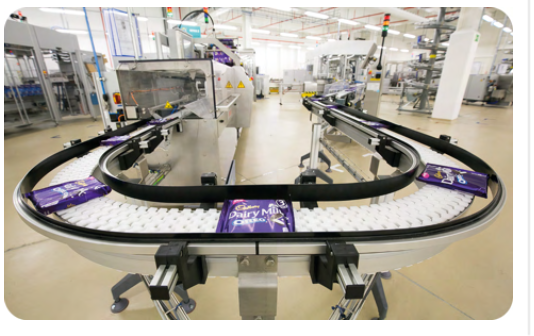Mondelēz 2024 Snacking Made Right Report: Sustainable Packaging
We work hard to use packaging that does more than protect our products and delight our consumers. At Mondelēz International, we strive to continually improve our packaging with the long-term aim of advancing our support for a more circular economy for packaging.
HIGHLIGHTS
- Approximately 96% packaging designed to be recyclable (11)
- Approximately (4.6)% reduction in overall virgin plastic (vs. 2020) (12)
STRATEGIC APPROACH
We believe that by improving our packaging and measuring our performance, we can make progress towards our long-term aim of advancing our support for a more circular economy for packaging.
CIRCULARITY IN PRACTICE
Working to help advance a more circular economy demands infrastructure development, investment, an enabling policy and regulatory environment, and cooperation between multiple stakeholders.
There are many challenges that may impede the advancement of a circular economy for packaging, including a landscape of disconnected national and sub-national policies, the need to transform complex global supply chains, and the sourcing of high cost and limited availability materials.
Collaboration is key to overcoming challenges and achieving progress. We collaborate with many companies and other stakeholders on topics ranging from innovation of more sustainable alternative materials to helping develop enhanced policies, including Extended Producer Responsibility (EPR). While impact from collaboration requires time to coordinate and deploy resources across many companies, we continue to make steady progress together.
Demonstrating our commitment to collaboration, in 2024 we continued to co-chair the CGF Plastic Waste Coalition of Action (PWCoA) Taskforce on Flexible plastic packaging, advancing important work to align consumer packaged goods companies on common requirements for flexible paper packaging and principles for effective EPR that includes flexible plastic packaging.
ACTION PLANS AND PROGRESS
We aim to remove unnecessary packaging and simplify packaging materials across the business. Our three part approach includes:
- Reducing Packaging by aiming to utilize packaging that is lightweight, safe and, where appropriate can be reused
or recycled. - Evolving Packaging involves aiming to design our packaging to be recyclable, removing problematic materials, and including recycled plastic, where appropriate, to help reduce packaging waste. Our goal is to use packaging that is designed to be recyclable and continue to use recycled content.
- Improving Systems means supporting the development of infrastructure and capabilities with the aim of being able to collect the packaging we place on the market. We support the implementation of effective policy and EPR schemes. These help enable the development of collection systems of all types of plastic packaging. We are collaborating with other companies, policymakers, investors and other key actors to help advance this work.
Significant progress has been made across the company to integrate our Global Sustainable Packaging Strategy into our local business strategies and roadmaps. In 2024 we continued to work with our local market and brand teams through workshops and training to help advance locally relevant programs for more sustainable packaging.
We believe that cross-functional collaboration is critical to our success and ability to deliver more sustainable solutions for packaging, especially in these areas:
- New innovative materials that support increased circularity and meet the quality and safety requirements of our products.
- Sourcing of new technologies such as materials made from recycled plastic.
- Globally consistent support for policy development and advancement of infrastructure.
By building on our strong foundations, we continue to move closer to meeting our goals and advancing our support for a more circular economy for packaging.
- REDUCING PACKAGING
We continue to progress towards achieving our 2025 goal of 5% reduction in our use of virgin plastic packaging versus 2020 levels and are set to continue to make progress over the year ahead. As a result of the slowly increasing supply of new materials, such as recycled content for flexible film, as well as successful line trials across a complex network of manufacturing sites we continue to reduce the use of virgin plastic in our packaging. In 2024, we were able to reduce our plastic packaging footprint by approximately (4.6)% versus 2020.(12)
For rigid plastic packaging, we are working to offset high category growth and reduce our use of virgin plastic by eliminating packaging and using more recycled content. For example, in 2024 our Southeast Asia Business Unit reduced virgin plastic use by approximately 150 metric tonnes by eliminating plastic trays across our cookie portfolio, including Oreo, Chipsmore and Cosy brands. While we believe we have a strong pipeline of projects for 2025, we anticipate facing challenges in sourcing new materials and overcoming technical challenges to qualify and implement new solutions. - EVOLVING PACKAGING
We continue to evolve our packaging materials to be more sustainable. In alignment with industry guidelines, we made progress in reducing our use of problematic materials such as PVC & PVDC and converting to recyclable packaging. At the end 2024 approximately 96% of our packaging was designed to be recyclable.(11)
We are working across our company to understand local needs, educate suppliers on Mondelēz International requirements, improve industry standards and help amplify impact through cross-industry collaboration. In 2024, we continued to support the advancement and adoption of the CGF’s Golden Design Rules, and as members of the Ocean Plastics Leadership Network (OPLN) are helping to influence more sustainable production of chemically recycled flexible plastic.
We also continued to increase our use of recycled plastic. In North America we are converting plastic cookie trays to include up to 50% recycled PET, and our UK & Ireland Business Unit announced that starting from 2025 we will wrap approximately 300 million Cadbury bars in packaging made using up to 80% ISCC+ mass balance certified recycled plastic, reducing virgin plastic use by approximately 600 metric tonnes per year.
We are also converting from plastic packaging to alternative materials, where beneficial. For example, in 2024 Cadbury converted from plastic to paper outerwrap for its Fingers and Animals multipacks, and LU introduced paper packaging for Véritable
Petit Beurre, Petit Brun Extra, and LU Thé biscuit multipacks. - IMPROVING SYSTEMS
To achieve a more circular economy for packaging, we believe that it is critical that the systems and infrastructure exist to collect, sort and recycle packaging waste. As such, we are working with many companies, investors, suppliers policymakers and other critical stakeholders to help improve policy design, help implement enhanced EPR schemes, and invest in new technologies
and infrastructure.
In 2024 as members of the Business Coalition for a UN Plastics Treaty and its Policy Working Group we continued to advocate for a legally-binding treaty that helps harmonize global policy. We hope to see progress toward a ratified agreement over the year ahead.
We are also working to help advance the development of enhanced EPR Schemes in various markets around the world. In the US, through our membership of the CGF PWCoA we helped establish the EPR Leadership Forum (ELF) and as founding board members of the Circular Action Alliance are working with other companies to help implement effective schemes in Colorado, Oregon and other states.
Finally, through the Circulate Capital Ocean Fund for Latin America and the Caribbean we are helping to advance the development of waste collection and recycling infrastructure, with inaugural investments made in Brazil and Colombia in 2024.
GOALS AND METRICS
SUSTAINABLE PACKAGING GOALS
- 5% recycled plastic content by 2025
- 98% or more of our packaging designed to be recyclable by 2025
- 5% reduction in virgin plastic by 2025 (vs. 2020)
- 25% reduction in virgin rigid plastic by 2025 (vs. 2020)
PACKAGING PORTFOLIO(35)
| 2024 PROGRESS | |
| 2024 | |
| Corrugated (metric tonnes) | 429,400 |
| Paper (metric tonnes) | 237,000 |
| Flexible plastics (metric tonnes) | 124,500 |
| Rigid plastics (metric tonnes) | 53,400 |
| Glass (metric tonnes) | 11,200 |
| Other flexibles (metric tonnes) | 10,300 |
| Metals (metric tonnes) | 10,000 |
| Total weight of packaging (metric tonnes) | 875,800 |
SUSTAINABLE PACKAGING
| 2024 PROGRESS | ||||
| 2024 | 2023 | 2022 | 2021 | |
| Packaging designed(11) to be recyclable (%) | 96 % | 96 % | 96 % | 95 % |
| Reduction in overall virgin plastic (12) (vs. 2020) (%) | -4.60% | 1.7 % | 2.9 % | 4% |
| Reduction in virgin rigid plastic (vs. 2020) (%) (12) | 1.4 % | 10 % | 5.4 % | — |
| 5% recycled plastic content by 2025 (%) (13) | 1.6 % | 1.4 % | 1 % | 0.5 % |
An independent third-party was engaged to provide limited assurance of our 2024 performance on plastics and packaging material consumption and targets included in the above chart.
Read our assurance statement in our ESG Reporting & Disclosure Reporting Archive.
View the full 2024 Snacking Made Right Report.
(11) 2024 reported information covers the period from December 1, 2023 through November 30, 2024. Our annual reporting cycle for this metric differs from previous years as we migrate to calendar year reporting. Reported information utilizes forward looking volume estimates. Reported information is verified by an independent third-party and available in our ESG Reporting & Disclosure Reporting Archive.
(12) 2024 reported information covers the period from December 1, 2023 through November 30, 2024. Our annual reporting cycle for this metric differs from previous years as we migrate to calendar year reporting. We have recalculated our base year 2020 due to data improvements. We have restated 2023 and 2022 metrics for year-over-year comparison. Reported information is verified by an independent third-party and available in our ESG Reporting & Disclosure Reporting Archive.
(13) 2024 reported information covers the period from December 1, 2023 through November 30, 2024. Our annual reporting cycle for this metric differs from previous years as we migrate to calendar year reporting. Reported information is verified by an independent third-party and available in our ESG Reporting & Disclosure Reporting Archive.
(35) 2024 reported information covers the period from December 1, 2023 through November 30, 2024. Our annual reporting cycle for this metric differs from previous years as we migrate to calendar year reporting.



